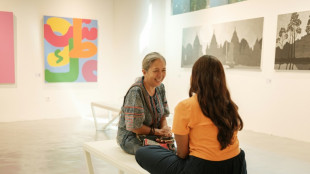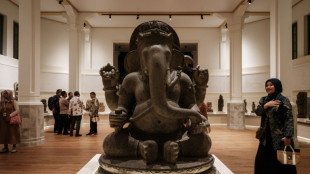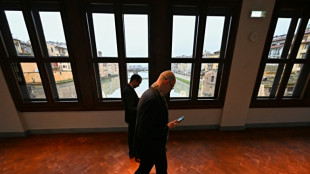
-
 Ski great Vonn finishes 14th on World Cup return
Ski great Vonn finishes 14th on World Cup return
-
Scholz visits site of deadly Christmas market attack

-
 Heavyweight foes Usyk, Fury set for titanic rematch
Heavyweight foes Usyk, Fury set for titanic rematch
-
Drone attack hits Russian city 1,000km from Ukraine frontier

-
 Former England winger Eastham dies aged 88
Former England winger Eastham dies aged 88
-
Pakistan Taliban claim raid killing 16 soldiers

-
 Pakistan military courts convict 25 of pro-Khan unrest
Pakistan military courts convict 25 of pro-Khan unrest
-
US Congress passes bill to avert shutdown

-
 Sierra Leone student tackles toxic air pollution
Sierra Leone student tackles toxic air pollution
-
German leader to visit site of deadly Christmas market attack

-
 16 injured after Israel hit by Yemen-launched 'projectile'
16 injured after Israel hit by Yemen-launched 'projectile'
-
Google counters bid by US to force sale of Chrome

-
 Russia says Kursk strike kills 5 after Moscow claims deadly Kyiv attack
Russia says Kursk strike kills 5 after Moscow claims deadly Kyiv attack
-
Cavaliers cruise past Bucks, Embiid shines in Sixers win

-
 US President Biden authorizes $571 million in military aid to Taiwan
US President Biden authorizes $571 million in military aid to Taiwan
-
Arahmaiani: the Indonesian artist with a thousand lives

-
 Indonesians embrace return of plundered treasure from the Dutch
Indonesians embrace return of plundered treasure from the Dutch
-
Qualcomm scores key win in licensing dispute with Arm

-
 Scientists observe 'negative time' in quantum experiments
Scientists observe 'negative time' in quantum experiments
-
US approves first drug treatment for sleep apnea

-
 US drops bounty for Syria's new leader after Damascus meeting
US drops bounty for Syria's new leader after Damascus meeting
-
Saudi man arrested after deadly car attack on German Christmas market

-
 'Torn from my side': horror of German Christmas market attack
'Torn from my side': horror of German Christmas market attack
-
Bayern Munich rout Leipzig on sombre night in Germany

-
 Tiger in family golf event but has 'long way' before PGA return
Tiger in family golf event but has 'long way' before PGA return
-
Pogba wants to 'turn page' after brother sentenced in extortion case

-
 Court rules against El Salvador in controversial abortion case
Court rules against El Salvador in controversial abortion case
-
French court hands down heavy sentences in teacher beheading trial

-
 Israel army says troops shot Syrian protester in leg
Israel army says troops shot Syrian protester in leg
-
Tien sets-up all-American NextGen semi-final duel

-
 Bulked-up Fury promises 'war' in Usyk rematch
Bulked-up Fury promises 'war' in Usyk rematch
-
Major reshuffle as Trudeau faces party pressure, Trump taunts

-
 Reggaeton star Daddy Yankee in court, says wife embezzled $100 mn
Reggaeton star Daddy Yankee in court, says wife embezzled $100 mn
-
Injured Eze out of Palace's clash with Arsenal

-
 Norway's Deila named coach of MLS Atlanta United
Norway's Deila named coach of MLS Atlanta United
-
Inter-American Court rules Colombia drilling violated native rights

-
 Amazon expects no disruptions as US strike goes into 2nd day
Amazon expects no disruptions as US strike goes into 2nd day
-
Man Utd 'more in control' under Amorim says Iraola

-
 Emery insists Guardiola 'still the best' despite Man City slump
Emery insists Guardiola 'still the best' despite Man City slump
-
US confirms billions in chips funds to Samsung, Texas Instruments

-
 English Rugby Football Union chairman quits amid pay row
English Rugby Football Union chairman quits amid pay row
-
Major reshuffle as Trudeau faces party pressure, Trump attacks

-
 Gatland remains as Wales boss but must 'change fortunes on the pitch'
Gatland remains as Wales boss but must 'change fortunes on the pitch'
-
Argentina's dollar craze cools under greenback-loving Milei

-
 Medici secret passageway in Florence reopens after refit
Medici secret passageway in Florence reopens after refit
-
Anger after Musk backs German far right

-
 Arteta says 'best is yet to come' as he marks five years at Arsenal
Arteta says 'best is yet to come' as he marks five years at Arsenal
-
Pereira happy to achieve Premier League 'target' with Wolves

-
 'Dark lull' in German energy transition sparks political debate
'Dark lull' in German energy transition sparks political debate
-
Russian skaters allowed to compete as neutrals in 2026 Winter Olympics


Morocco's tribeswomen see facial tattoo tradition fade
As a young girl growing up in the Atlas mountains, Hannou Mouloud's family took her to have her chin tattooed with the cherished lines that generations of Moroccan Amazigh tribeswomen wore.
"When I was six, they told me tattoos were pretty adornments," recalled the 67-year-old from Imilchil village of the once-common practice among women in North Africa's Amazigh groups.
Long referred to as Berbers, many tribespeople from the area prefer to be called Amazigh, or Imazighen, which means "free people".
Today, like in many of the Indigenous cultures across the world where facial tattoos were long prevalent, the practice has largely faded.
Many attribute the near-disappearance of facial tattoos to Morocco's changing religious attitudes in recent decades, with interpretations of Islam where inked skin and other body modifications like piercings are prohibited taking hold.
"We would use charcoal to draw the designs on our faces, then a woman would prick the drawing with a needle until blood came out," Mouloud told AFP, adding that they would rub the wound daily with a chewed green herb to deepen the tattoo's colour.
The markings vary in design between the minority's tribes and were used to signify the wearer's origin while offering beauty and protection.
Being tattooed would hurt, said Hannou Ait Mjane, 71, and "we couldn't hold back our tears" but it "remains a tradition that our ancestors passed down to us".
- Fundamentalism -
Morocco has the largest Amazigh population in North Africa, with Tamazight, the community's language, recognised as an official language alongside Arabic.
According to the most recent census in 2014, more than a quarter of Morocco's 35 million inhabitants speak at least one dialect -- Tarifit, Tamazight or Tachelhit.
Abdelouahed Finigue, a geography teacher and researcher from Imilchil, told AFP that women often had their chins, foreheads or hands tattooed.
"Some women had intimate areas tattooed as a wedding gift, expressing their love for their husband," he added.
The designs held different meanings to the different communities.
"The woman, through her tattoos, expresses her beauty and her value as an individual independent of the man," he said, explaining what the different shapes can mean.
"The circle, for example, represents the universe and beauty, just like the moon and the sun which occupied an important place in local rites," he said.
But changing religious trends means fewer women are getting inked.
"In recent years, this custom has been tainted by preconceived ideas from Salafist currents," he added, referring to a Sunni Islamist movement that seeks to return to the practices and teachings of the Prophet Mohammed.
Bassou Oujabbour, member of local development association AKHIAM, said women with the markings have faced social pressure.
"Fundamentalists sometimes describe tattooing as the devil's book or as the first thing to be burned on the human body," he said.
"Some women even removed the tattoos long after getting them for fear of punishment after death."
R.Veloso--PC
